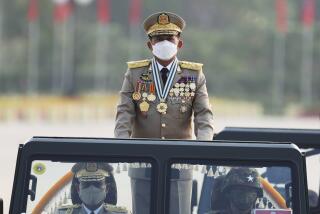Beijing Orders Army to Give Up Its Businesses
- Share via
BEIJING — Attempting to shake up China’s mammoth military establishment, President Jiang Zemin has ordered the armed forces to pull out of the commercial ventures that have enriched them for years through ownership of everything from five-star hotels to taxi companies, state-run media reported Wednesday.
Speaking at a high-level People’s Liberation Army conference on smuggling, Jiang told top military officials that “the army and armed police forces must earnestly carry out checks on all kinds of commercial companies set up by subsidiary units, and without exception from today must not engage in their operation,” the New China News Agency reported.
The directive, which promises to be difficult to implement, is aimed at thousands of businesses run by the PLA and the national People’s Armed Police, government bodies that have taken advantage of their privileged position in Chinese society and the nation’s capitalist reforms to rake in billions of dollars during the past decade.
Among the army-run enterprises are such stars as the luxurious Palace Hotel in downtown Beijing and the popular 999 stomach tonic, China’s answer to Pepto-Bismol.
As lucrative as the businesses are, however, many Chinese officials fear that the economic sidelights have hampered efforts to modernize the PLA, which is the world’s largest army--and one of the most inefficient and backward among major nations’ militaries. Jiang reportedly warned PLA leaders that the army’s reputation was at stake.
The PLA must “focus efforts to fully build the military,” state-run press quoted Jiang as saying.
His new edict is the latest, and perhaps the boldest, drive by Beijing over the past several years to overhaul the Chinese military, which has between 2 million and 3 million troops.
But whether the policy will be fully executed remains to be seen. No timeline was given for implementing the move, nor details as to how it would be accomplished. The sheer size of the task is staggering: One reliable Hong Kong-based estimate puts the number of PLA-owned businesses at 15,000, which together generate as much as 3% of China’s gross domestic product.
And as with other centrally issued orders, the new directive’s success will depend greatly on the willingness of local authorities to carry it out--a big if, analysts say. Indeed, some rank-and-file PLA members engaged in commercial activities scrambled to find out Wednesday whether the new order would really affect them.
“It is going to be very hard to implement, given the size of the PLA,” said Harry Harding, a China expert at George Washington University. “This is not the first time they have tried to close down business operations of the army. . . . They did that several years back, and I don’t think it was ever fully implemented.”
In 1993, concern over PLA profiteering, smuggling and battle-readiness led military officials to shut down 40% of PLA commercial entities and prohibit combat units from running businesses.
The PLA’s economic empire permeates all aspects of Chinese life. The army wholly or partly owns prime chunks of urban real estate, hospitals, pager networks, clothing mills, automotive works, professional sports teams and even pig farms.
Profits, as high as $3 billion a year, are plowed back into military investment, including upgraded equipment, and often into officers’ pockets.
In a real sense, the PLA’s commercial involvement has been driven by necessity. During the 1980s, China slashed defense spending to concentrate on economic reforms and reduced the size of the army from more than 4 million members to its current size. To make up the financial difference, the central government encouraged the PLA to go into business.
Now, almost every level of the PLA, from local units to central headquarters, is engaged in some type of business. The vast majority of PLA-run businesses are small and barely profitable, but up to 1,000 large enterprises pull in major revenue, and a handful have become massive conglomerates, according to Tai Ming Cheung, an expert on PLA dealings.
Many of the bigger PLA companies have impeccable connections to the central government. For example, the enormous Poly Group, which was involved in a deal that put thousands of commercial assault rifles into circulation in the United States a few years ago, is run by Wang Jun, the son of China’s late Vice President Wang Zhen.
Mindful of popular anger against corruption, the Beijing leadership has tried to clamp down on such activities by the sons and daughters of high-ranking officials, or “princelings,” as the offspring are known.
Some of that emphasis on corruption was reflected in the fact that Jiang announced his new policy at an anti-smuggling conference held in Beijing at PLA headquarters on Monday and Tuesday. Army-run businesses have been implicated in smuggling operations around China, whose borders are policed by the PLA.
As the chairman of China’s Central Military Commission, Jiang is commander in chief of the armed forces. But his control of the military has often been considered tenuous, since he lacks the military experience and history that made the leaders before him, Mao Tse-tung and Deng Xiaoping, unassailable in their grip on power.
“I would assume that he could not decide this entirely on his own,” said Harding of George Washington University. But nonetheless, “I do think this is the sign of a relatively confident Jiang Zemin--to take on powerful interests in the military in this way.”
More to Read
Sign up for Essential California
The most important California stories and recommendations in your inbox every morning.
You may occasionally receive promotional content from the Los Angeles Times.














